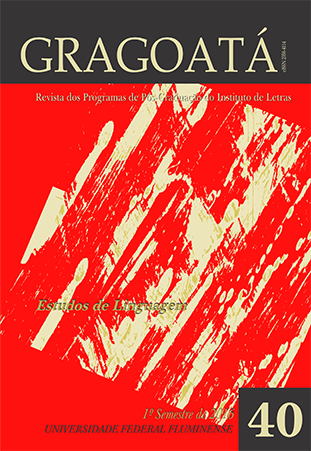SMILE: YOU ARE ON CAMERA. SPECTACULARIZATION OF POLICE PRACTICE AND MORAL CLEANING WORK
DOI:
https://doi.org/10.22409/gragoata.v21i40.33389Keywords:
spectacularization, policing, “Pacifying Police Unit”, “moral cleaning”, technological mediationAbstract
The imaging technologies offered by cell phones allow any common citizen to produce their own spectacles and make them public. In this paper, we focus on one of the daily events that have been widely reported in Brazil: the actions of police officers that experience a new form of policing called “Pacifying Police Unit” (“Unidade de Polícia Pacificadora”, UPP) in favelas in the city of Rio de Janeiro. Using the theoretical apparatus of Applied Conversation Analysis (ANTAKI, 2011) and studies of multimodality (GOODWIN, 2000; 2010), we conducted a multimodal analysis of a video, posted on YouTube, which records the moment when police officers face resistance of a suspect who refuses to be driven to the police station. Considering that police officers are aware that their actions are being recorded and their image of police officers are in general under constant suspicion (MUNIZ, 1998), our goal is to investigate the types of “moral cleaning” mechanisms (MACHADO DA SILVA, 2008) used by them to escape from a stigma. Based on the analysis of this case, we claim that the technological mediation makes communication seem less unilateral, through mechanisms such as the inclusion of information not captured by the cameraman and explanation of the rules that guide police officers’ actions, especially with regard to the degree of force. Making “moral cleaning” efforts, police officers try to build the image of professionals who act according to the precepts of military-police ethics, as the performance of their duties with fairness and justice.
Downloads
Downloads
Published
How to Cite
Issue
Section
License
Authors who publish in Gragoatá agree to the following terms:
The authors retain the rights and give the journal the right to the first publication, simultaneously subject to a Creative Commons license CC-BY-NC 4.0, which allows sharing by third parties with due mention to the author and the first publication by Gragoatá.
Authors may enter into additional and separate contractual arrangements for the non-exclusive distribution of the published version of the work (for example, posting it in an institutional repository or publishing it in a book), with recognition of its initial publication in Gragoatá.

Gragoatá is licensed under a Creative Commons - Attribution-NonCommercial 4.0 International.











